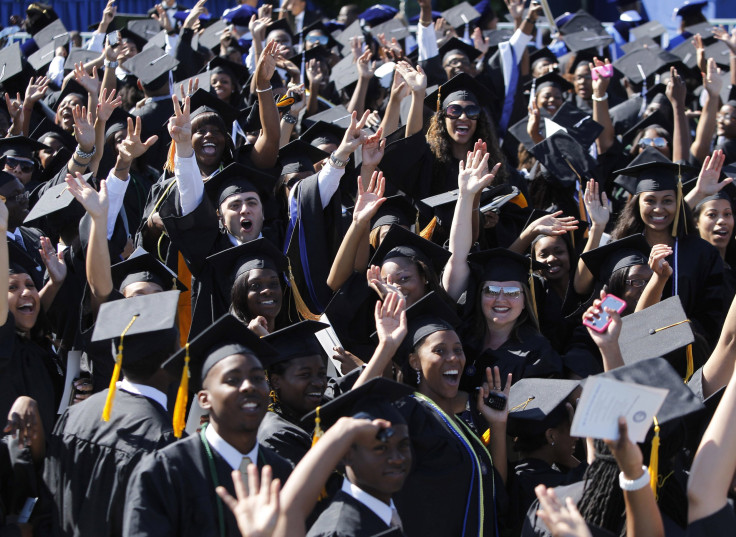Black Unemployment: College Degree Offers Advantages, But No Escape From Racialized Job Markets

As the U.S. economic recovery inches forward, it's become popular in some circles to suggest that anyone who's qualified and wants a job can find one. “This is a tremendous time to go to work if you’ve got the skills,” John Engler, head of a powerful business lobby, said on a recent call with reporters, endorsing a view that’s long been fashionable among employers, especially in high-tech Silicon Valley.
But that view is also inaccurate. Data show that the “skills gap” is largely a myth. There are still more job seekers than job openings in most industries. And for educated workers who are black, the canard is especially clear.
Millions are finding out firsthand that higher education in the United States does not provide the sort of beeline to high-paying employment that it seemingly promised. But for black America, the connection between college and a job is especially tenuous.
“I felt like I did everything right, if you were to look at my track on a piece of paper,” said Sikiru Tijani, 29, a graduate of Illinois Wesleyan University. Since January 2014 he has worked a part-time job in retail that he originally thought of as temporary.
The Search Continues
After graduating with honors in 2008, Tijani moved to Japan, where he taught English, then worked at a city hall, translating, interpreting and planning events with local officials and foreign dignitaries. In August 2013, Tijani returned to Illinois, hoping to apply for graduate programs in international business. After landing the retail gig to ease his transition, he began the search for something more permanent to bolster his resume. With help from some family friends, he got in touch with recruiters who sent his resume to employers in marketing, advertising and international trade. More than a year later, his search continues.
"I found myself constantly getting replies of ‘no,’” said Tijani, who majored in international business and lived and worked abroad for five years. “If you’re not interested, that’s fine, but I wish you’d make that decision after an interview, just so you can see what I’m about.”
Tijani remains optimistic, but on occasion wonders about the race factor.
“It has you questioning that,” Tijani said. “It’s like, 'OK, they saw my resume, they saw my name. Were they turned off by my name? Did they do a Google search of my name? Did they see my LinkedIn profile?' Certain things like that do pop into your mind but you don’t have any solid proof to say, ‘Well, yeah, it’s because I’m black.’”
Either way, Tijani said, “I couldn’t let that get me down. What if it is because I’m black? I can’t change that.”
Studies show there’s a good chance that race is, in fact, the reason. There are few other conceivable explanations for the fact that black college graduates suffer from an unemployment rate roughly double that of their white counterparts, experts say.
The unemployment rate for African-Americans with at least a bachelor’s degree is 5.2 percent. It’s even higher for recent college graduates: 12.4 percent of those between the ages of 22 and 27 are unemployed. Neither fact, though, accounts for those like Tijani who fit the profile of white-collar professionals, but are instead working part-time or low-paying jobs traditionally associated with people who only have high school degrees.
“Most of this is the result of racial discrimination and different levels of access to networks,” said Valerie Wilson, director of the Program on Race, Ethnicity and the Economy at the Economic Policy Institute, a left-leaning think tank. “What we’ve seen more and more of is just how much racial bias can play into people’s decision-making even if it’s not a conscious decision.”
In other words, employers in highly competitive sectors like information technology, finance or consulting -- which tend to attract college-educated job seekers -- are likely to select qualified white applicants over qualified black applicants.
Dylan Over DeAndre
An influential 2004 study found that job seekers with black-sounding names were 50 percent less likely than their white counterparts to get callbacks. The divide held across occupation, industry and employer size. A more recent study found that such a gap applies even to graduates of elite schools like Harvard and Yale. When given the option, most interviewers would take a Dylan over a DeAndre. (Tijani, whose name is West African, said he was a bit surprised at the lack of interviews he was offered.)
Social networks also play a major role in reproducing racial hierarchies in the labor market, according to a recent study by Professor Nancy DiTomaso at Rutgers Business School. Whites disproportionately hold down jobs of prestige and high pay. And when those in high places bestow favors to their buddies, former classmates and acquaintances, they perpetuate racial divides, whether intentionally or not.
Education offers an advantage, but not an escape from America’s racialized job markets.
In February, the overall 10.4 percent black unemployment rate was twice that of whites. That 2-to-1 ratio has persisted for decades, and it’s not going away anytime soon, according to a report released Thursday by the Economic Policy Institute. By the end of the year, 4.2 percent of white workers will be officially unemployed, compared to 10.4 percent of black workers, according to projections from Moody’s Analytics included in the report.
“You just have to keep going because your opportunity is there,” Tijani said, “and you’ll find it or it will find you.”
© Copyright IBTimes 2024. All rights reserved.












